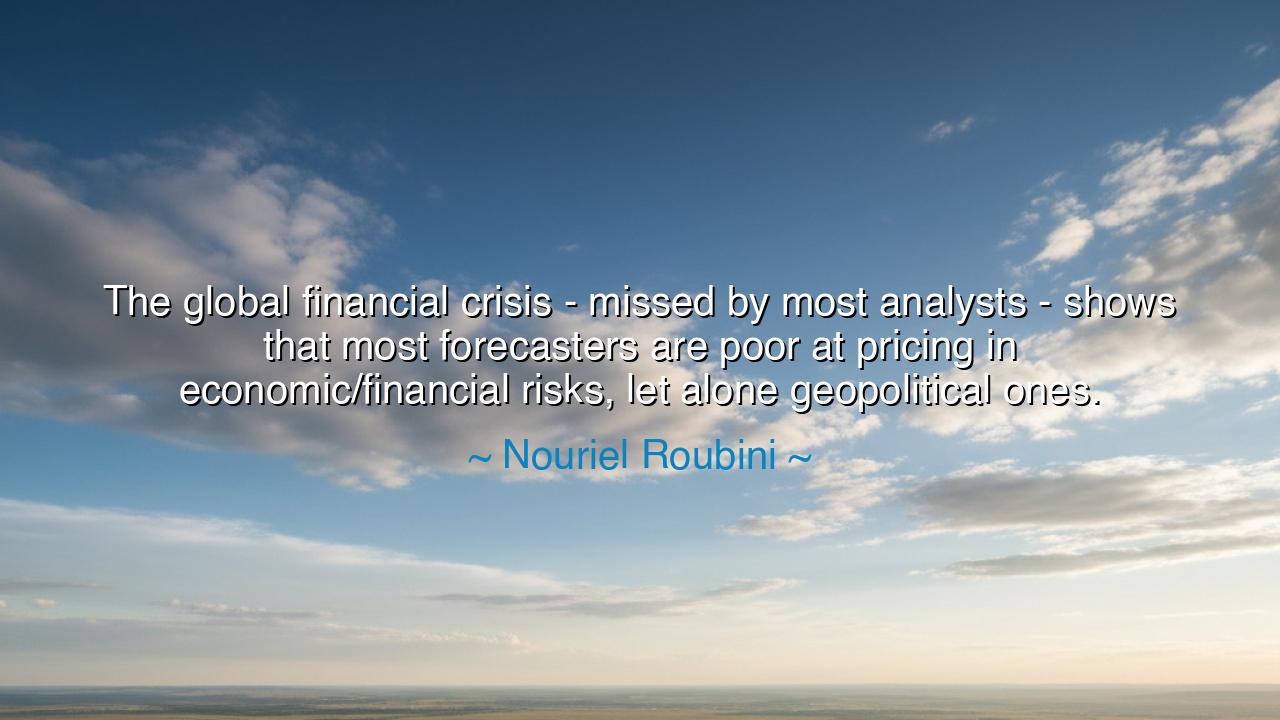
The global financial crisis - missed by most analysts - shows
The global financial crisis - missed by most analysts - shows that most forecasters are poor at pricing in economic/financial risks, let alone geopolitical ones.






“The global financial crisis — missed by most analysts — shows that most forecasters are poor at pricing in economic and financial risks, let alone geopolitical ones.” — Thus spoke Nouriel Roubini, the economist once mocked as “Dr. Doom,” whose warnings of catastrophe proved not the ravings of fear, but the foresight of one who sees beneath the surface of appearances. His words, carved in the aftermath of the crisis that shook the world in 2008, are not merely an indictment of economists and their models — they are a meditation on the blindness of human certainty, the arrogance of those who mistake patterns for prophecy. In this quote, Roubini exposes the fragility of prediction itself, and reminds us that the storms which wreck civilizations often form in skies men believe to be clear.
The origin of this quote is found in Roubini’s reflections following the collapse of financial markets during the Great Recession — an era when banks fell, nations trembled, and illusions of stability shattered. Years before the crisis, while others celebrated unending growth, Roubini warned that the world’s financial systems were built on sand — inflated by greed, hidden debt, and the reckless assumption that tomorrow would mirror today. Few listened. Economists, armed with equations and optimism, trusted in their models as priests once trusted in omens. But when the collapse came, their confidence dissolved into silence. Roubini’s words stand as both rebuke and revelation: that knowledge without humility is blindness, and that no formula can fully grasp the chaos of the human world.
This failure, he says, is not limited to economics. If the wise cannot predict financial risk, how much less can they foretell geopolitical turmoil — the movements of nations, the eruptions of war, the collapse of empires? For these forces are driven not by numbers but by passions: ambition, fear, pride, revenge. The ancients knew this truth well. Thucydides, chronicler of the Peloponnesian War, wrote that men wage war not through reason, but through envy and power. Likewise, Roubini’s warning reminds us that the heart of crisis is not only in the market but in the soul — in the greed that blinds and the complacency that numbs.
Consider the tale of the Trojan Horse. The Trojans, wise in counsel and strong in defense, could not imagine that their destruction would come disguised as a gift. Their seers failed to foresee what lay hidden within the walls of their own security. So too did the world’s financiers in 2008: they invited the horse of debt into their cities, admiring its beauty, ignoring its danger. The true lesson of Roubini’s words is thus not about finance alone, but about the timeless human tendency to trust comfort over caution, to believe that the structures we build are stronger than the storms that approach.
The ancients would have called this blindness hubris — the sin of pride that precedes the fall. The forecasters Roubini speaks of were not evil men, but men lulled by the illusion of control. They believed that data could conquer uncertainty, that the market obeyed human will. Yet the world, like the sea, cannot be tamed by numbers. It moves with unseen currents, driven by winds of emotion, policy, and chance. To live wisely, therefore, is to remember that uncertainty is eternal, and that the task of wisdom is not to erase it, but to respect it.
And yet, within Roubini’s warning lies also a call to vigilance and humility. He does not say that foresight is futile — only that it must be tempered with awareness of its limits. The wise leader, the prudent investor, the responsible citizen must look not only at what is seen, but at what is ignored. One must listen to dissenting voices, study the patterns of history, and question even the most comforting assumptions. For risk, like disease, grows strongest when denied. The fall of nations, the collapse of markets, the outbreak of wars — all are born from the same blindness: the refusal to believe that the unthinkable can happen.
Therefore, let this be the lesson: never confuse confidence with certainty, nor stability with safety. Whether in finance, politics, or life itself, the unseen dangers are often those we choose not to see. Build your knowledge, but fortify it with humility. Trust in reason, but remember that reason alone cannot master fate. The wise man prepares for what he cannot predict; the fool is destroyed by what he refuses to imagine.
So, when Roubini warns that most forecasters fail to price in risk, he speaks as a prophet to every generation: that the greatest dangers are not those that lie before us, but those we believe we have conquered. To live with wisdom is to expect the storm even in calm seas, to seek truth even when the crowd celebrates illusion. For the world’s balance is delicate, and the wise must walk upon it with both courage and care — ever watchful, ever humble, knowing that the winds of change respect no man’s certainty.






AAdministratorAdministrator
Welcome, honored guests. Please leave a comment, we will respond soon